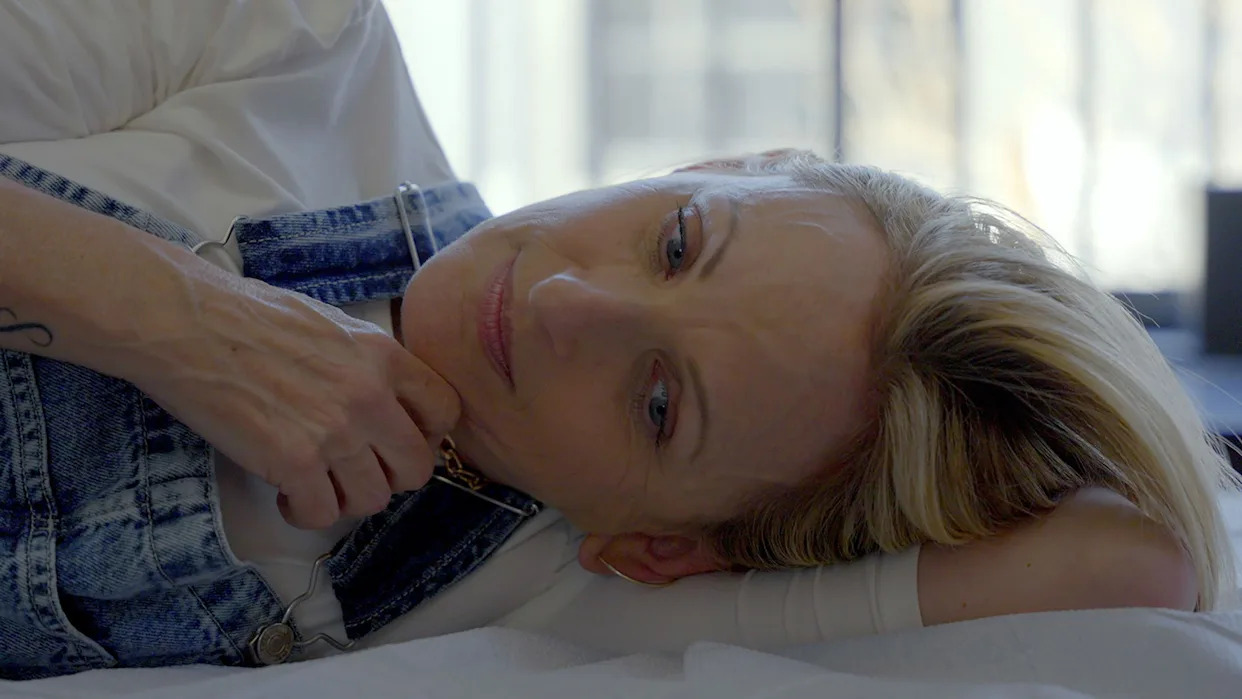How a new documentary paints a complete portrait of Marlee Matlin

As I like to say, a documentary’s success can be measured by what the audience learns while watching. I learned a lot about the eponymous subject in “Marlee Matlin: Not Alone Anymore.”
Before the film, I knew Matlin was a groundbreaking actress with a lot of talent. But along with her stature in Hollywood came responsibility that, whether she wanted the role or not, made Matlin a trailblazing advocate for the deaf and hard of hearing. Plus, the doc captures the dark dynamics of her life in a way that adds dimensions to its story without being exploitative. It’s a must-watch if you’re interested in show business or politics or just compelling personalities.
“Not Alone Anymore” starts with Matlin’s casting in the 1986 film “Children of a Lesser God.” A critical and box-office success, it led to the novice actress not only becoming the first deaf person to win an Oscar, but also the youngest person to win a leading performer award. A record she still holds.
AdvertisementAdvertisement#«R14e4kr8lb2m7nfddbH1» iframe AdvertisementAdvertisement#«R24e4kr8lb2m7nfddbH1» iframeWhile this accomplishment didn’t exactly lead to casting agents beating down her door, it did get Matlin attention.
She made appearances on national news programs to address the controversy over the hiring of a able-hearing applicant to lead a deaf liberal arts school. (If that sounds familiar, the entire episode was the subject of the True/False Film Fest entry “Deaf President Now!” which is currently available on streaming platforms.) Matlin also appearedbefore Congress to advocate for closed-captioning technology to be added to new television sets.
As someone who’s never had to worry about such a thing, this segment was illuminating, showing how much work it takes to disrupt the status quo —and for that disruption to become commonplace. Nothing is easy, the film reminds us, until it is.
Other aspects of Matlin’s career are covered by “Not Alone Anymore” and serve as a good reminder of the artist's versatility. It’s fun to recall her appearance on a particularly effective “Seinfeld” arc or her role on “The West Wing.” Particularly illuminating is Aaron Sorkin’s interview, where he discusses how to write for a deaf character including, for example, a discussion on when to make the interpreter a distinctive character and when not to.
AdvertisementAdvertisement#«R19e4kr8lb2m7nfddbH1» iframe AdvertisementAdvertisement#«R29e4kr8lb2m7nfddbH1» iframeMore revealing is how the film captures Matlin’s struggles. There’s the family who blamed themselves for her condition and never fully embraced the need to properly communicate. Or the condescending comments from reporters and filmmakers. Or the fact that her choosing to speak at the Oscars would be so polarizing to the deaf community. Matlin might just want to be an actress, but there is much expected of someone when they are the first to break down barriers.
Harder still is the abuse, which Matlin doesn’t shy away from. While I recalled hearing about the darker elements of her off-screen relationship with “Lesser God” co-star William Hurt, it didn’t permeate the larger cultural discussion, as it happened before the MeToo movement became more pronounced. But this segment is rough, even as Matlin handles the conversations with measured repose.
An interesting approach taken by “Not Alone Anymore” is revisiting the Oscar ceremony where she won best actress and was given the statue by Hurt, who was presenting because he won best actor the year before. Seeing it earlier in the film versus seeing the same segment after learning what we now know is a revelation. Facial expressions and hand gestures take on new meaning. Filmmaker Shoshannah Stern is able to expertly show how abuse can be hidden in plain sight in front of millions.
“Not Alone Anymore” succeeds because Matlin is so open and revealing. She not only addresses her personal life but subjects like addiction and parenthood with equal honesty. Nothing is off limits. Not to mention she’s a charming and funny individual who can disarm the people around her as well as the audience.
AdvertisementAdvertisement#«R1ee4kr8lb2m7nfddbH1» iframe AdvertisementAdvertisement#«R2ee4kr8lb2m7nfddbH1» iframeMore: How '40 Acres' goes beyond the average post-apocalyptic thriller
I cannot do the joke any justice, but there’s a moment towards the end of the film where she deadpans about a dog with multiple deceased owners that caused me to laugh out loud and makes me chuckle even thinking about it now.
Matlin is a funny, complicated woman with an incredible career despite the challenges placed in front of her by those who do not want to accept anyone or anything different. The documentary does a great job looking at all of her humanity, warts and all. At the end, we are better off for knowing her.
“Marlee Matlin: Not Alone Anymore” begins a local exclusive engagement at Ragtag Cinema this Friday.Catch it before it leaves town.
AdvertisementAdvertisement#«R1ke4kr8lb2m7nfddbH1» iframe AdvertisementAdvertisement#«R2ke4kr8lb2m7nfddbH1» iframeJames Owen is the Tribune’s film columnist. In real life,he is a lawyer and executive director of energy policy group Renew Missouri. A graduate of Drury University and the University of Kansas, he created Filmsnobs.com, where he co-hosts a podcast. He enjoyed an extended stint as an on-air film critic for KY3, the NBC affiliate in Springfield, and now regularly guests on Columbia radio station KFRU.
This article originally appeared on Columbia Daily Tribune: How a new doc paints a complete portrait of Marlee Matlin













